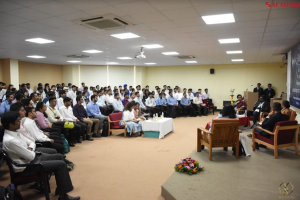The Guest Lecture Team of Symbiosis Centre for Management and Human Resource Development (SCMHRD) hosted a two-day event on 5th and 6th of November, 2019 – “ODYSSESY ’19: Confluence of Thoughts“. Confluence means ‘flowing together’. It is about convergence of factors, cultures, or of different ideologies. Odyssey in Greek refers to a long and eventful journey, Odyssey 2019 was surely one such eventful journey for all the attendees. The panel discussions on both days were moderated by Ms. Sunita Sharma, Motivational Speaker, Blogger and Entrepreneur.
“We must develop a comprehensive and globally shared view of how technology is affecting our lives and reshaping our economic, social, cultural, and human environments. There has never been a time of greater promise, or greater peril.” These are the wise words of Klaus Schwab, the Founder and Executive Chairman of the World Economic Forum regarding the fourth industrial revolution or Industry 4.0 which was the topic for day 1 – “Industry 4.0-A Paradigm shift.”
The esteemed panel members included,
Nivedita Nanda, CHRO, Kaya Limited
Rohit Mogra, Head HR-IT, Deutsche Bank
Vijay Navgire, Head-TA, Parkar Consulting and Labs
Sweety Ahmad, Head-TA, Pegasystem

Industry 4.0 is based on IT infrastructure, which increases the productivity of the organisation and reduces the time taken to market a product. The life cycle of a product is restructured in this revolution which opens new avenues, among which cloud based technologies are a viable option. Decision making processes, learning and development and strategizing businesses have to be more agile and aligned with industry trends.
Fields like business analytics and data integration are witnessing rapid changes and the current millennia’s ability to respond to these changes should be improved
A committed leadership, unified ownership, investment and trust in in-house talent forms the basis of Industry 4.0. The will to learn and change and the quality to up-skill oneself to embrace that change, define Industry 4.0, thereby directing us towards the future
The technologies reshaping the industry, the qualities that the students of a B-school should have, the importance of human and emotional aspects in a machine dominated the industry, the challenges that the industry may face and a few possible workarounds for the same were discussed and pondered in depth. Altogether, it was indeed an enlightening session.
“The gig economy is empowerment. This new business paradigm empowers individuals to better shape their own destiny and leverage their existing assets to their benefit”. These are the wise words of John McAfee, the Founder of McAfee Associates regarding Gig Economy. The topic for day 2 revolved around the same – “GIG Economy: An Opportunity or Challenge”

The esteemed panel members for this discussion were,
Shourya Chakravarty, CHRO, Aptech
Siddhartha Rastogi, MD, Ambit Capital
Vikas Upadhyay, Chairman, MD, Excellere Marketing
Sangeetha Balachandar, HR Director, Trimble
The discussion can be summarized in the following points,
Gig economy can be compared to a human cloud where employees cannot be full time workers. For the organisations, based on the business needs, fixed costs can be controlled, profits can be maximized and the atmosphere can be made more advantageous. It was also noted that gig economy has not extended itself to the positions of CXOs in any organisation so far.
Gig economy is also regulated by its own set of rules and laws to prevent exploitation of gig workers
From quoting Mahabharata to Chanakya, the concept of the Gig Economy could not have been made clearer to the audience. The various advantages and shortcomings of the Gig economy were discussed. It was interesting to witness a different school of thought on this topic among the panellists. How the generation today is a pro gig and how an organization must embrace this characteristic was also a topic of consideration. With statistics, laws, news and supporting figures, the discussion was very informative and interesting.
Overall, these two days, definitely witnessed a paradigm shift in our mindsets!
